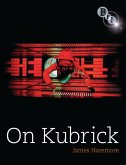In a comprehensively revised and updated new edition, James Naremore provides an illuminating critical account of the films of Stanley Kubrick, from his earliest feature, Fear and Desire (1953), to the posthumously-produced A.I. Artificial Intelligence (Steven Spielberg, 2001). Naremore offers provocative analyses of each of Kubrick's films, considering his emphasis on the absurdity of combat, as in Paths of Glory (1957) and Full Metal Jacket (1987), the failure of scientific reasoning, as in 2001 (1968), and the fascistic impulses in masculine sexuality, as in Dr Strangelove (1964) and Eyes Wide Shut (1999). He argues that while Kubrick was a voracious intellectual and a life-long autodidact, the fascination of his work has less to do with the ideas it espouses than with the emotions it evokes.
Combining close readings with new insights into the production histories and cultural contexts of key films, Naremore provides a concise yet thorough discussion that will be useful to students of Kubrick's filmmaking and cinephiles who seek a deeper insight into the work of this perfectionist genius.
Revised throughout, this new edition also includes a fully updated bibliography of critical writings on Kubrick's cinema.
Combining close readings with new insights into the production histories and cultural contexts of key films, Naremore provides a concise yet thorough discussion that will be useful to students of Kubrick's filmmaking and cinephiles who seek a deeper insight into the work of this perfectionist genius.
Revised throughout, this new edition also includes a fully updated bibliography of critical writings on Kubrick's cinema.









